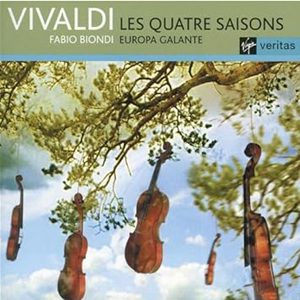Fabio Biondi and Europa Galante burst onto the musical scene with their first recording of The Four Seasons for Opus 111. That disc was a best seller, and deservedly so. For this remake, they have opted to use various original manuscript versions of each concerto in Vivaldi’s Op. 8, a clever gambit that, quite frankly, most listeners will neither notice nor care about. Nor should they. What matters is the fact that the performances are every bit as brilliant and exciting as we have come to expect from this group, and if two of the erstwhile violin concertos appear here in versions for oboe (Nos. 9 & 12), well, so much the better.
Biondi still wields a mean violin. He’s got the chops for the wilder moments in “La tempesta di mare”, to say nothing of the finales of “Summer” and “Winter”; but he floats a lovely cantabile at such moments as the lazy central movement of “Summer” (with an especially loud barking viola). There are so many terrific performances of this music available that it may seem pointless to add another; but if you want the entire Op. 8 in great sound, stunningly performed, this set will certainly do.
































